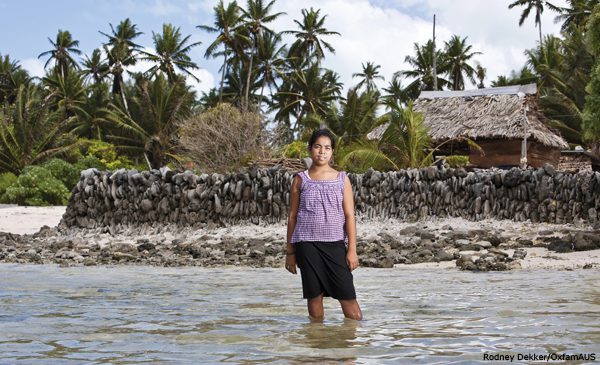More than half of the world’s population have made their home in a coastal region, whether they are subsistence fishermen in Bangladesh or high flying city bankers in New York.
For many low-lying areas, scientists warn that the coming century is likely to witness sea level rise that will change the shape of coastlines around the globe.
Imagine the impact to your own home. If your house, workplace and neighbourhood were at risk of being washed away by rising sea levels and high tides linked to climate change, what would you do?
While coastal cities such as Sydney, New York and Singapore have the resources to protect against rising sea levels, many small island nations are at risk of disappearing beneath the waves.
The nine islands that make up the country of Tuvalu are located in the Pacific Ocean midway between Australia and Hawaii. The highest point on Tuvalu sits at just 4.5 metres above sea level, making it incredibly vulnerable to high tides and sea level rise.
This February, the king tide – the name given to the highest tides of the year – will have a dramatic impact on the shoreline and lowest lying areas of Tuvalu. We want to raise the profile of the lives of the people who are on the frontline of climate change and simultaneously give you the opportunity to learn about the climate impacts our Pacific neighbours are feeling now.
Our team will be on the ground in Tuvalu during the king tide, talking to people living in the affected areas, and we want to know what you want to know.
Vote below on which topics you would like our panel of reporters to investigate (or write your own question in the comments below):
[poll id=”8″]
Our team in Tuvalu:
- Reverend Tafue Lusama – Community and church leader, Tuvalu
- Maina Talia – Church climate change officer, Tuvalu
- Florent Baarsch – member of the international youth climate movement, currently working in Tuvalu on a climate change awareness project ‘Klima-Tuvalu’
- Lan Marie Berg – climate change specialist, also in Tuvalu working on ‘Klima-Tuvalu’
- Rodney Dekker – award winning Australian photographer in Tuvalu to document the impact of the king tide.
Learn more about Tuvalu:
- WATCH a short video featuring the story of Nui, grandfather and farmer



